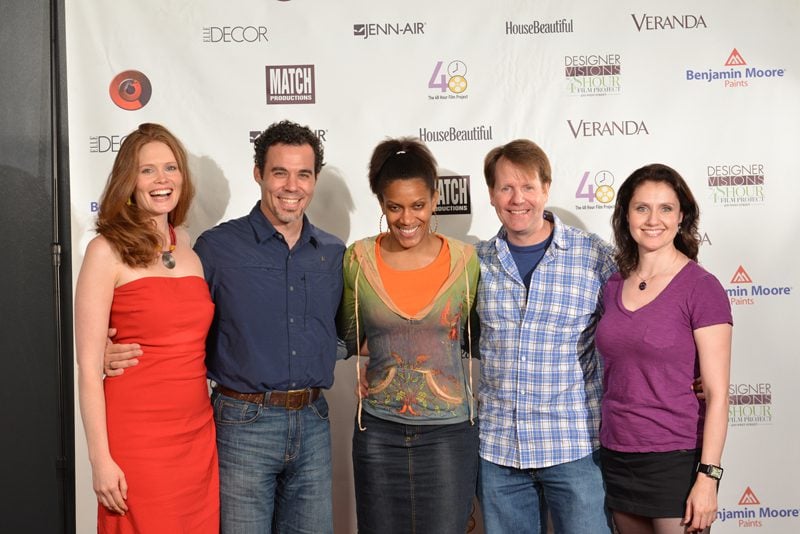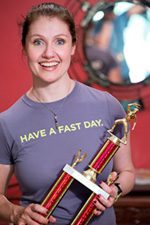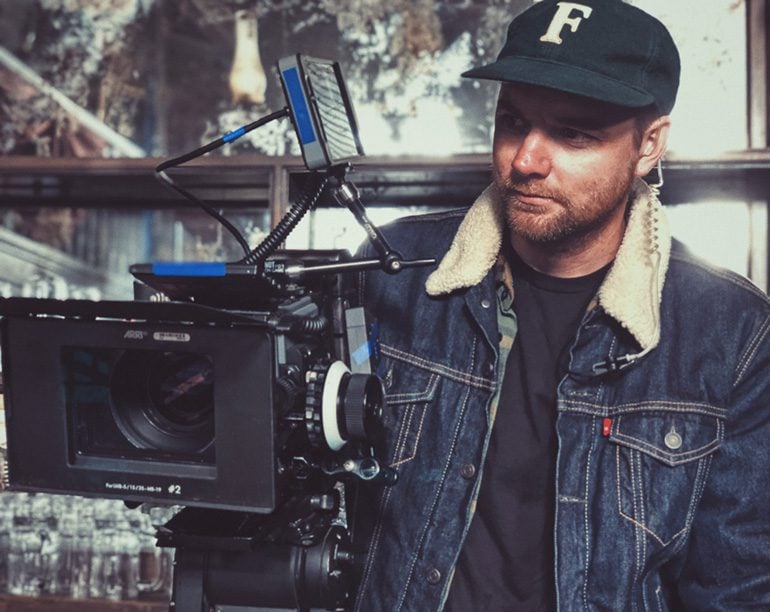Pictured: For “Apt. 2B” at the NY 48 Hour Film Festival with Catherine Frels, Gregory Isaac, Tracey Conyer Lee, Sean Harris and Tamar Kummel.
Speed Filmmaking Do’s and Don’ts
Teamwork on a tight timeline
By Tamar Kummel
I’ve done a dozen or so competition short films. You know the kind you hear about: You have 48 hours, 72 hours, 24 hours to make an entire short film and turn it in at the appointed time. Each competition has certain required elements, usually a prop, a line of dialogue, a character name. And they will often give you the genre drawn out of a hat. This is a fantastic way of learning to write/direct/produce/act quickly. You have to make good, fast decisions. You need to play well with others. You can meet a ton of people. You can connect with other filmmakers and start to build your crew. And best of all, it’s a great way to just simply know you’re going to finish a film at the end of the competition. You’ll have something for your reel. Unfortunately, the films don’t always, or should I say, NEVER, turn out exactly how you pictured them in your head. These are usually not masterpieces. But if you set yourself up for success, there’s no reason that your little film that cost you almost nothing to make (most competitions don’t allow anyone to get paid) can’t send you to film festivals all over and get your work seen by lots of people. And if it didn’t turn out the way you wanted, it’s still a great experience, something for a resume and IMDB, and fun. Hopefully fun. It should be fun. Filmmaking should always be fun.
Important Do’s
-
Do hire people that have multiple skills (edit/boom, sound/lights, costume/cook). You want overlaps for safety’s sake.
-
Do have a location or two already set up. This is one less thing to scramble to find, and puts limitations on the writing, which can help narrow down the story.
-
Do have professional actors on standby of all types. (Just a few; not twenty.)
-
Do arrange great meals for all. This is important for ALL film shoots.
-
Do prepare people for what the weekend will be like. This includes the emotional and experiential feel of the game. Be prepared for fast schedules, be 100% ready to jump, and 100% equipped to change everything as needed – quickly.
-
Do rehearse for camera. Always.
-
Do get flexible people that can roll with the punches. This is always important. No divas, no one counting lines, no one asking for closeups or extra takes. This is not the time for that. But really – who ever has time for that?
-
Do get it in on time. If you miss being eligible for the awards, or having it screened, what was the point?
-
Do have a couple basic storylines floating around your head based on pre-cast and locations.
-
Do put it on IMDB fast. Cast and crew will appreciate it. Double check and make sure you give the right credits to the right people.
-
Do submit the finished film to other short film festivals. That’s the only big cost you’ll have.
-
Do make a schedule and stick to it.
Example schedule:
-
Brainstorm for 1 hour.
-
Write for 2 hours.
-
Call actors.
-
Set call times for early in the AM.
-
Shoot for 4 hours.
Important Don’ts
-
Don’t say, “I’ll fix it in post” There’s no time for that. Fix it now.
-
Don’t expect it to be your masterpiece.
-
Don’t expect everything to go swimmingly. Have a lot of Plan B’s.
-
Don’t expect a lot of sleep. But please, get some sleep.
-
Don’t expect to win awards. If it’s not a great film, it was great experience and goes on the resume. No one will know if it’s good or not besides the people at the festival.
-
Don’t forget the required elements or the required tags in the editing. You don’t want to be disqualified for forgetting a prop, a line or adding a two-second credit.
-
Don’t assume someone else is taking care of something you haven’t discussed. Someone organized must be in charge.
-
Don’t assume your DP knows how every camera works. Discuss that ahead of time.
-
Don’t do everything yourself. Act/write/direct/produce. Pick one or two at most.
-
Don’t forget to have fun.
-
Don’t forget any normal rules of set etiquette.
Tamar Kummel is an actress, writer, director, and producer in New York City and Los Angeles. She has a background in stand-up comedy, having produced several comedy shows in New York City. She’s also written and performed sketch comedy, a one-person show, “Cultural Immersion”, and several plays and films. In 2011, she formed Captain Purple Productions LLC, a production company for films and more. She is also the author of the self-published book, “How to Run Auditions”. She wrote and directed the documentary film, “Fighting for Allergy-Free Food” (2020).
Check out Tamar’s website at www.captainpurpleproductions.com.
Tamar Kummel.
On the set of “Apt. 2B”.
Photo by Maverick Sean Photography.







2 thoughts on “Speed Filmmaking Do’s and Don’ts”
Speed Filmmaking can be extremely challenging, but indeed, you shouldn’t expect to have a lot of sleep during that time.
I was always surprised by what filmmakers do when they are given a short amount of time compared to when they have all the time in the world. Sometimes, speed is a good generator of ideas and productivity.